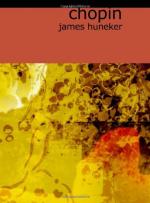Chopin left for Scotland in August and stopped at the house of his pupil, Miss Stirling. Her name is familiar to Chopin students, for the two nocturnes, opus 55, are dedicated to her. He was nearly killed with kindness but continually bemoaned his existence. At the house of Dr. Lyschinski, a Pole, he lodged in Edinburgh and was so weak that he had to be carried up and down stairs. To the doctor’s good wife he replied in answer to the question “George Sand is your particular friend?” “Not even George Sand.” And is he to be blamed for evading tiresome reminders of the past? He confessed that his excessive thinness had caused Sand to address him as “My Dear Corpse.” Charming, is it not? Miss Stirling was doubtless in love with him and Princess Czartoryska followed him to Scotland to see if his health was better. So he was not altogether deserted by the women—indeed he could not live without their little flatteries and agreeable attentions. It is safe to say that a woman was always within call of Chopin.
He played at Manchester on the 28th of August, but his friend Mr. Osborne, who was present, says “his playing was too delicate to create enthusiasm and I felt truly sorry for him.” On his return to Scotland he stayed with Mr. and Mrs. Salis Schwabe.
Mr. J. Cuthbert Hadden wrote several years ago in the Glasgow “Herald” of Chopin’s visit to Scotland in 1848. The tone-poet was in the poorest health, but with characteristic tenacity played at concerts and paid visits to his admirers. Mr. Hadden found the following notice in the back files of the Glasgow “Courier”:
Monsieur Chopin has the honour to announce that his matinee musicale will take place on Wednesday, the 27th September, in the Merchant Hall, Glasgow. To commence at half-past two o’clock. Tickets, limited in number, half-a-guinea each, and full particulars to be had from Mr. Muir Wood, 42, Buchanan street.
He continues:
The net profits of this concert are said to have been exactly L60—a ridiculously low sum when we compare it with the earnings of later day virtuosi; nay, still more ridiculously low when we recall the circumstance that for two concerts in Glasgow sixteen years before this Paganini had L 1,400. Muir Wood, who has since died, said: “I was then a comparative stranger in Glasgow, but I was told that so many private carriages had never been seen at any concert in the town. In fact, it was the county people who turned out, with a few of the elite of Glasgow society. Being a morning concert, the citizens were busy otherwise, and half a guinea was considered too high a sum for their wives and daughters.”
The late Dr. James Hedderwick, of Glasgow, tells in his reminiscences that on entering the hall he found it about one- third full. It was obvious that a number of the audience were personal friends of Chopin. Dr. Hedderwick recognized the composer at once as “a little, fragile-looking




